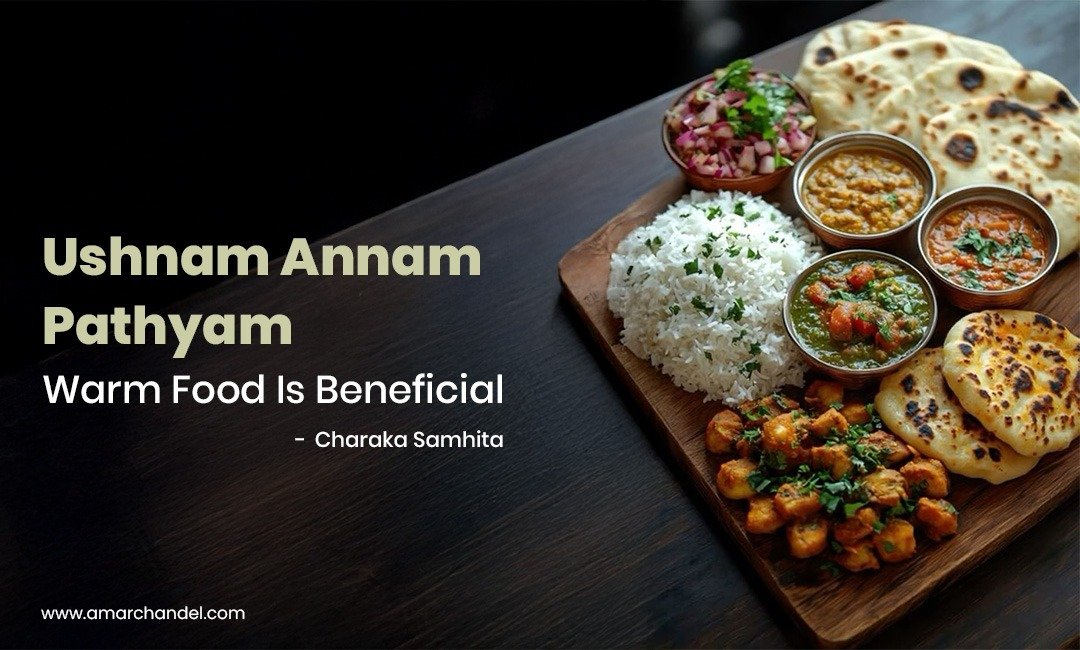“Ushṇam annam pathyam”
“Warm food is beneficial.”
— Charaka Samhita
This verse emphasises the importance of consuming warm food for better digestion, nutrient absorption, and overall health. Ayurveda considers food temperature a crucial factor in maintaining digestive fire (Agni), which governs metabolism and health.
The ancient wisdom of “Ushṇam Annam Pathyam” from the Charaka Samhita is supported by modern science, proving that warm food is crucial for digestion, metabolism, immunity, and overall well-being.
Eating warm, freshly prepared food is a simple yet powerful habit that can prevent disease, enhance energy, and promote longevity. By following this Ayurvedic principle, we can align our diet with nature, ensuring better health and vitality in today’s fast-paced world.
The term “Ushṇam” (उष्णम्) means warm or hot, while “Annam” (अन्नम्) means food. The word “Pathyam” (पथ्यम्) refers to wholesome, easily digestible, and health-promoting food. This verse suggests that warm food is ideal for digestion and well-being.
In modern nutrition, warm meals are linked to better digestion, enhanced metabolism, improved gut health, and increased satiety. Scientific studies confirm that eating warm food helps the body process nutrients efficiently, prevents bloating, and supports immune function.
Modern research supports the Ayurvedic view that food temperature affects digestion, metabolism, and overall health. Here’s how:
Warm Food Aids Digestion
• The human digestive system functions best at body temperature (around 37°C). Warm food matches this temperature, allowing enzymes and gastric juices to work efficiently.
• Scientific Evidence: A study in the World Journal of Gastroenterology (2019) found that warm food improves digestion and reduces acid reflux, while cold food slows digestion.
• Example: Traditional Indian meals are served warm and freshly cooked, reducing the risk of indigestion.
Warm Food Enhances Nutrient Absorption
• Heat breaks down complex food molecules, making nutrients easier to absorb.
• Scientific Evidence: Research in The American Journal of Clinical Nutrition (2021) showed that warm meals enhance the bioavailability of vitamins and minerals compared to cold meals.
• Example: Cooked vegetables provide more beta-carotene and lycopene, supporting eye and heart health.
Warm Food Activates Digestive Enzymes
• Warm food stimulates digestive secretions, including bile and pancreatic enzymes, aiding in protein and fat digestion.
• Scientific Evidence: Studies in The Journal of Physiology (2020) found that cold food suppresses digestive enzyme function, leading to bloating and poor digestion.
• Example: Drinking warm herbal tea after meals enhances digestion, while ice-cold drinks slow metabolism.
Warm Food Improves Gut Health
• The gut microbiome thrives in a warm environment, while cold food disrupts gut bacteria balance, leading to bloating and constipation.
• Scientific Evidence: A study in Gut Microbes (2022) found that warm meals promote a healthier gut microbiome, reducing inflammation and improving immunity.
• Example: Ayurveda recommends hot soups, warm herbal teas, and fresh-cooked meals for gut health.
Warm Food Boosts Metabolism and Immunity
• Warm food increases metabolic rate, helping the body burn calories more efficiently.
• Scientific Evidence: Research in Metabolism: Clinical and Experimental (2018) showed that cold meals slow down metabolism, while warm meals keep the body’s energy systems active.
• Example: In winter, warm meals keep the body warm and prevent sluggishness, improving immune function.
Warm Food is More Satisfying and Comforting
• Warm meals activate taste buds, releasing more saliva and digestive enzymes. This enhances the satisfaction and enjoyment of food.
• Scientific Evidence: A study in the Appetite Journal (2019) found that people who ate warm meals felt fuller and more satisfied than those who ate cold meals.
• Example: Traditional home-cooked meals are preferred over cold, processed foods because they feel more nourishing.
Present-Day Significance
In today’s world of fast food, processed meals, and cold beverages, the ancient wisdom of Ushṇam Annam Pathyam is more relevant than ever. Many modern health problems—indigestion, obesity, acid reflux, bloating, and weakened immunity—are linked to eating cold, processed, or stale food.
Promotes Healthy Eating Habits: Eating warm, freshly cooked meals aligns with modern dietary recommendations for digestive and metabolic health.
Improves Digestion and Gut Health: Warm food enhances enzyme activity, nutrient absorption, and gut microbiome balance.
Supports Weight Management: Warm meals boost metabolism, preventing sluggish digestion and weight gain.
Strengthens Immunity: Consuming warm food reduces inflammation, supports the gut, and strengthens immune function.
Prevents Chronic Diseases: Warm food reduces the risk of diabetes, heart disease, and gastrointestinal disorders by improving digestion and metabolism.
Guidelines for Eating Warm Food
Ayurveda prescribes specific eating habits to ensure maximum health benefits from food:
Eat freshly cooked food: Avoid stale, refrigerated, or processed food, as it weakens digestion.
Drink warm water instead of cold beverages: Cold drinks slow digestion and cause bloating. Warm herbal teas or lukewarm water aid digestion.
Avoid frozen and raw food in cold climates: Salads and raw foods should be balanced with warm soups or cooked grains in winter.
Use digestive spices: Ginger, cumin, black pepper, and turmeric warm the digestive system and enhance metabolism.
Eat slowly and mindfully: Eating warm food mindfully enhances satiety and prevents overeating.


Give a Reply